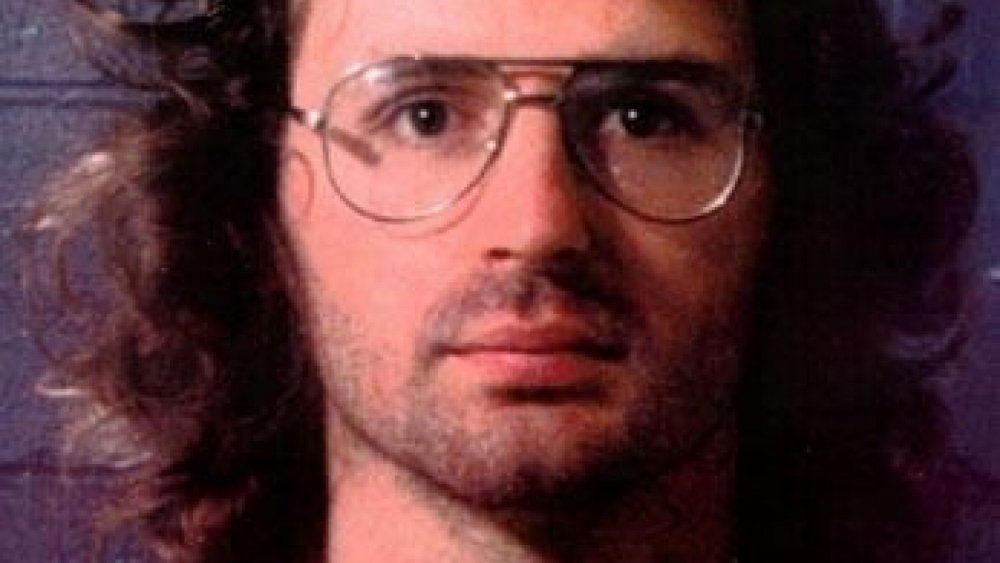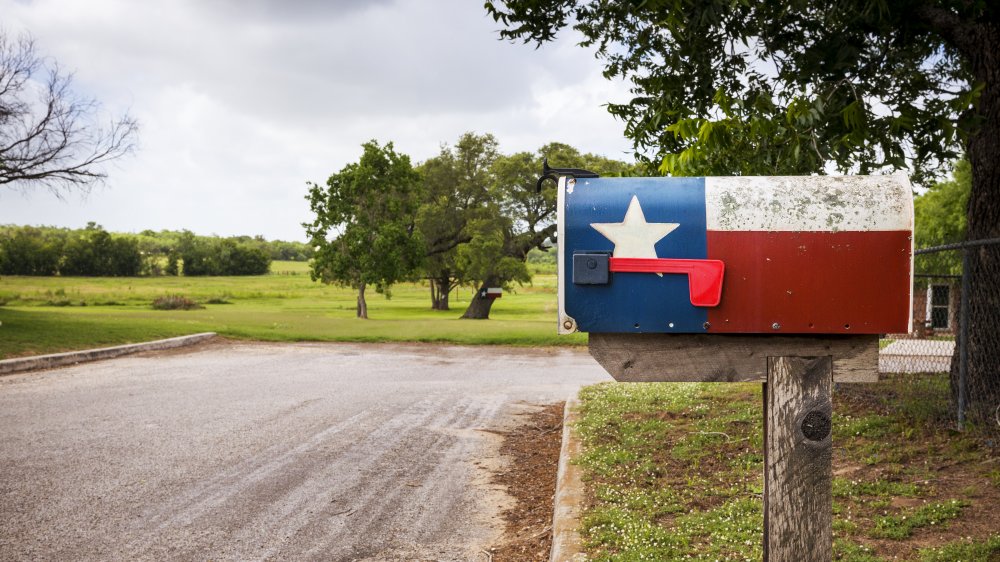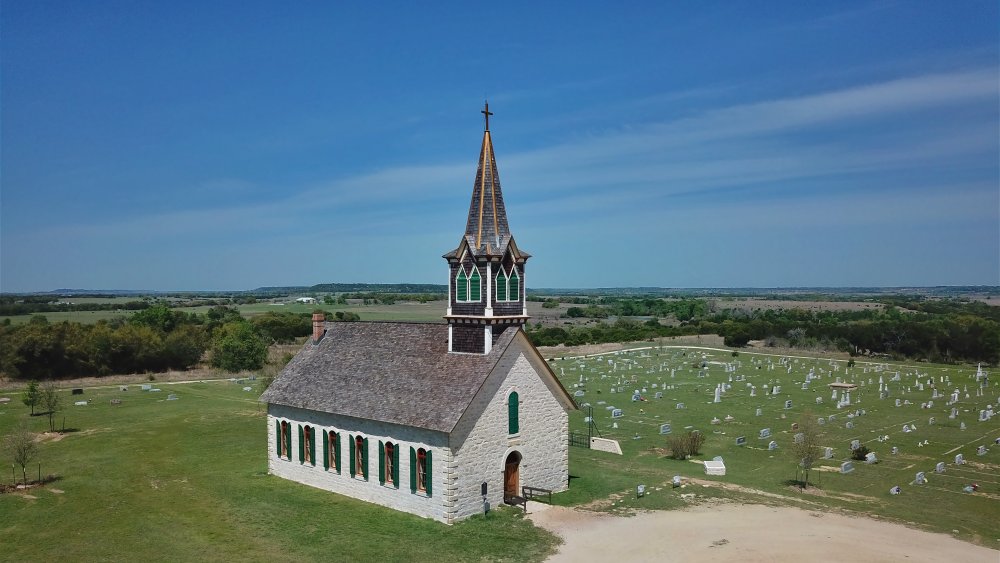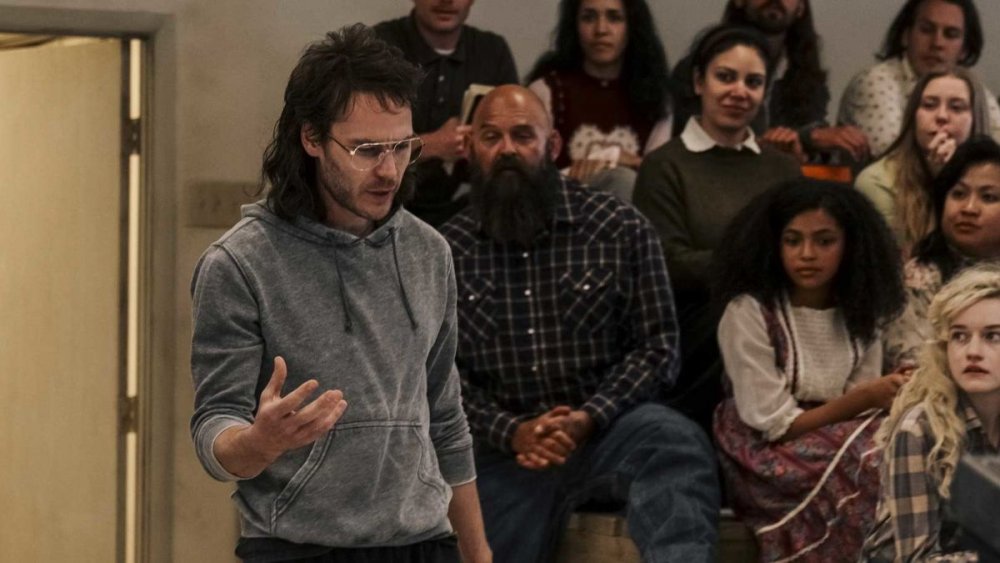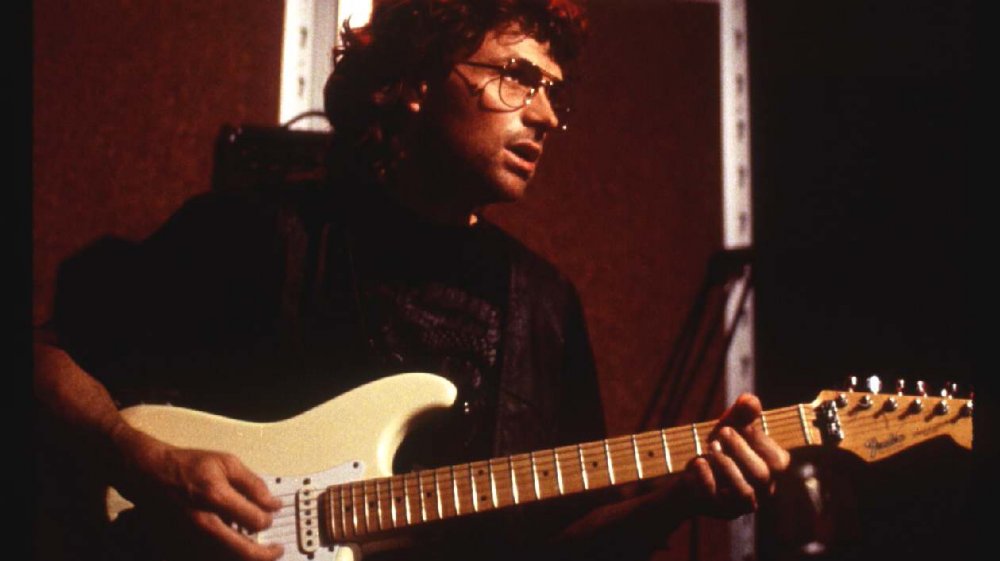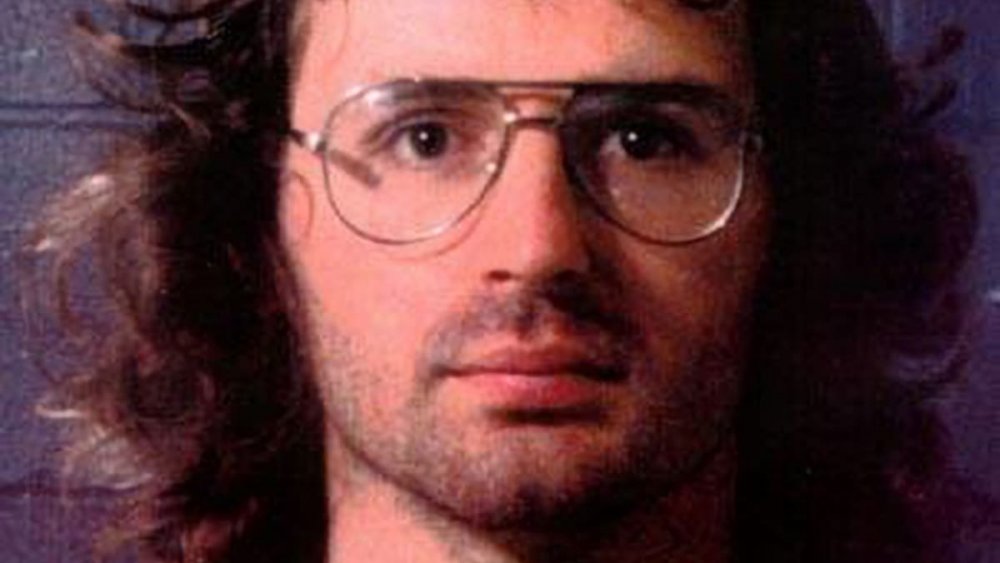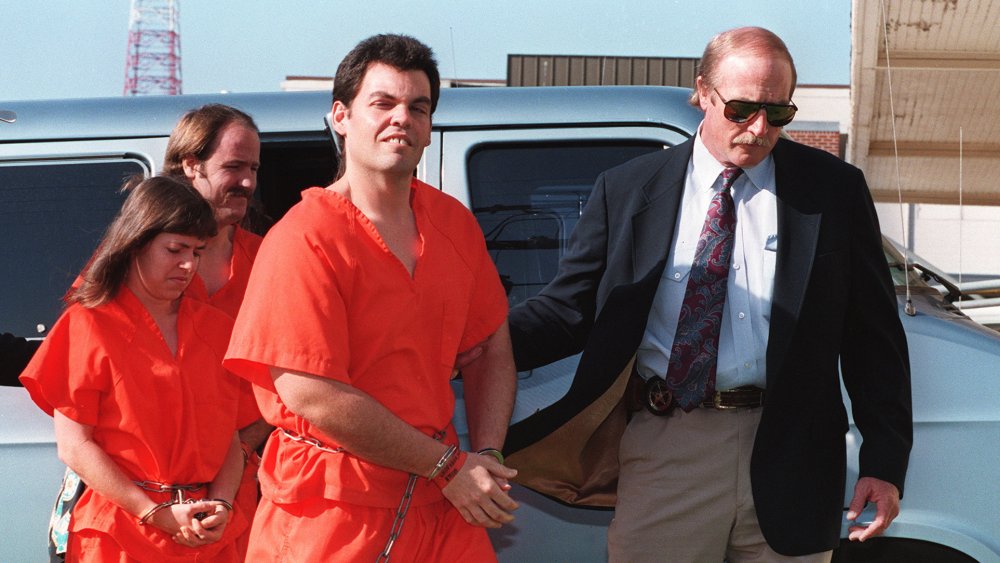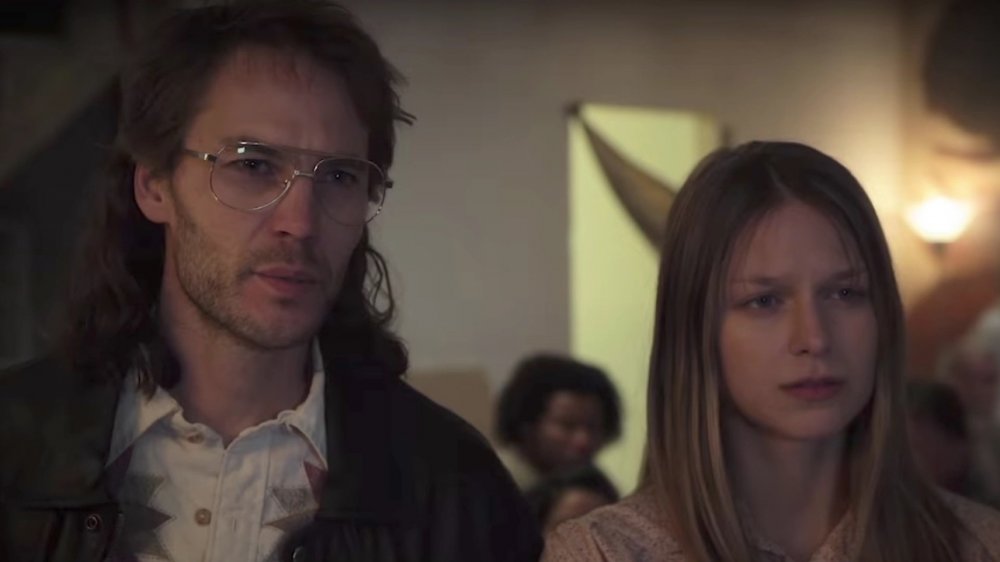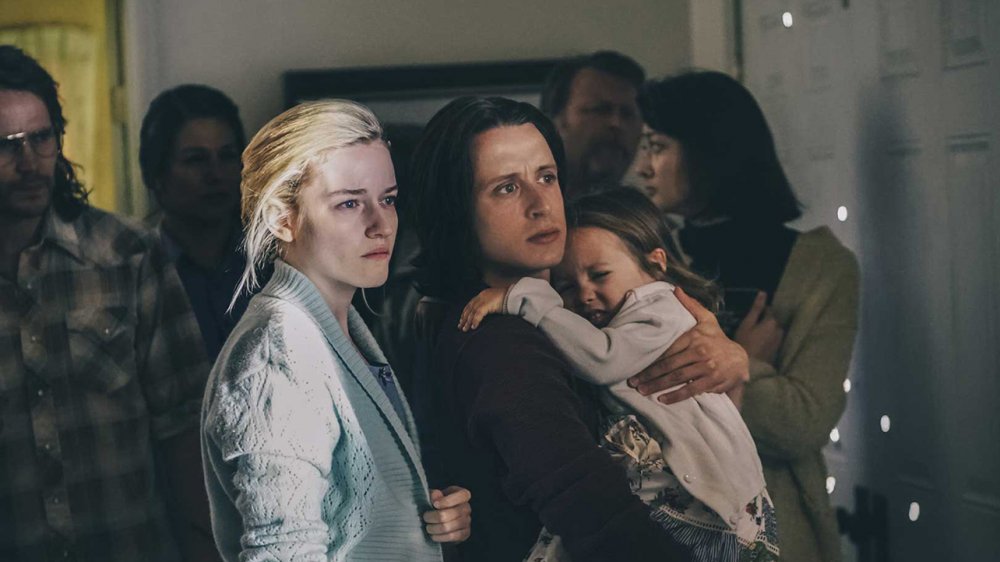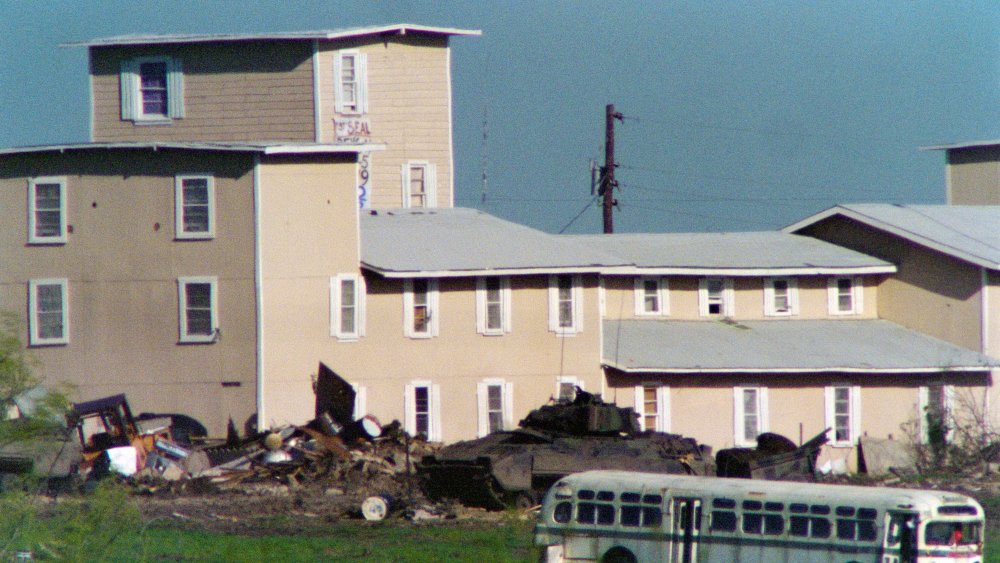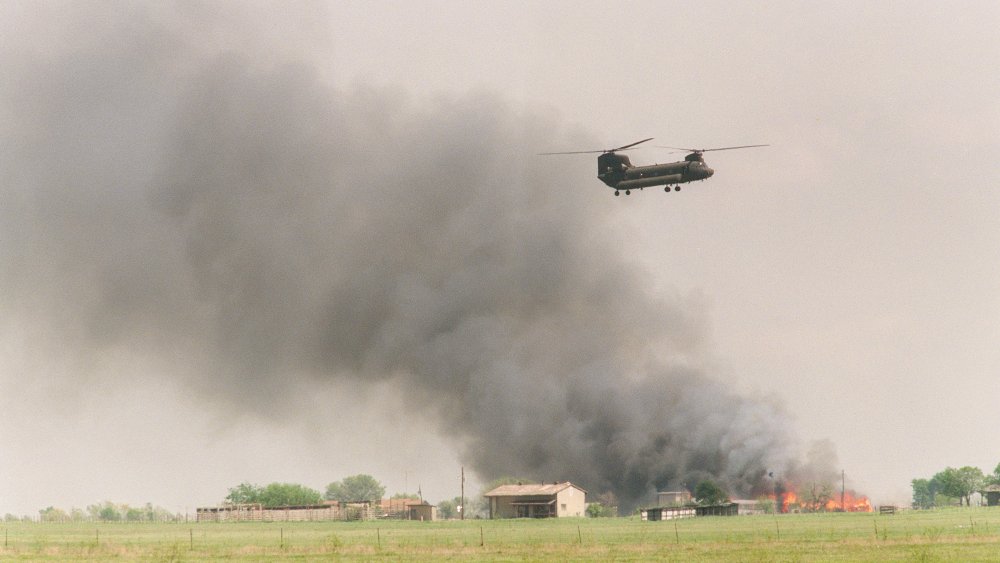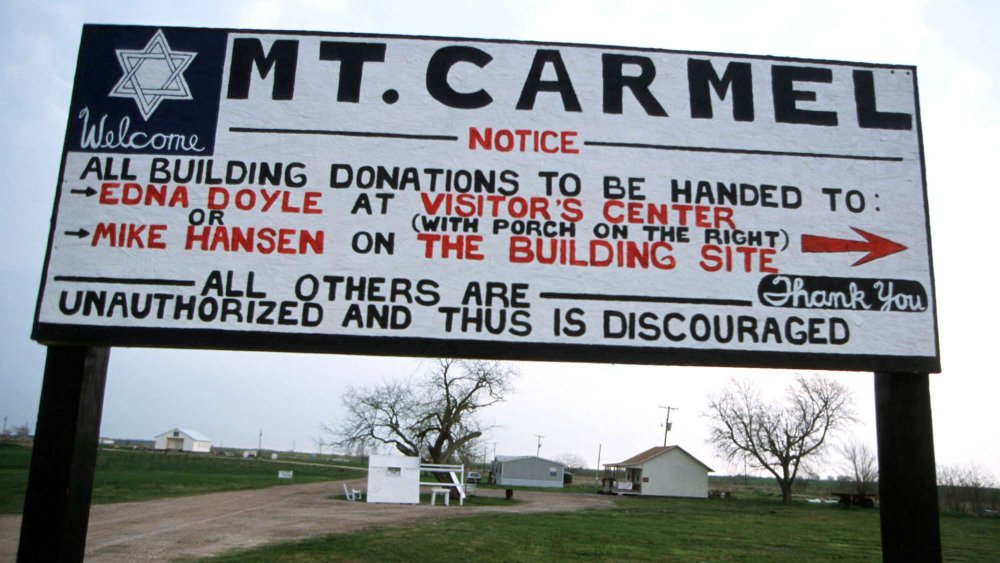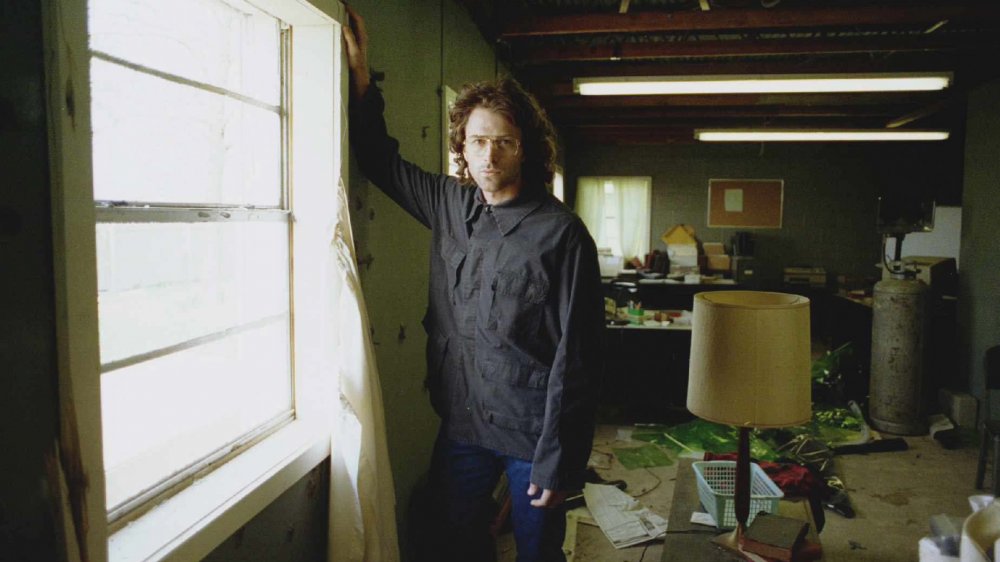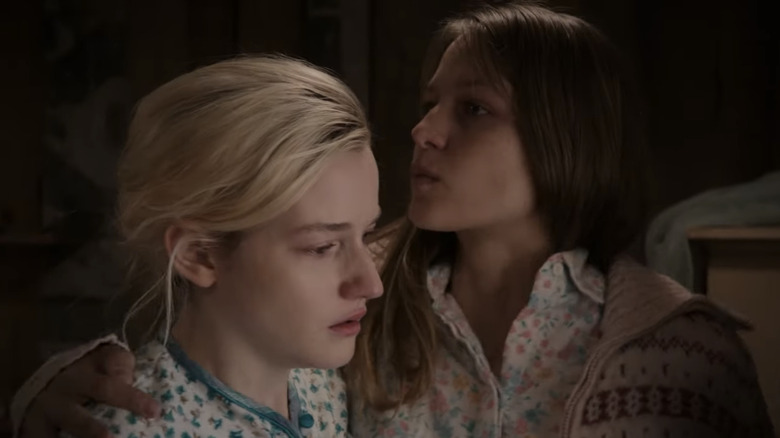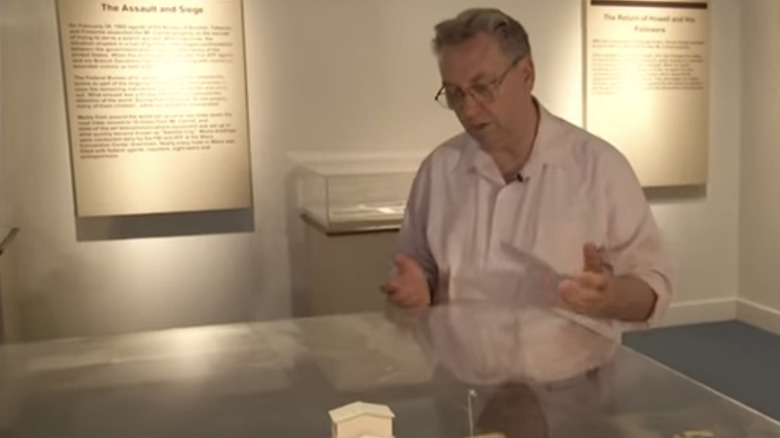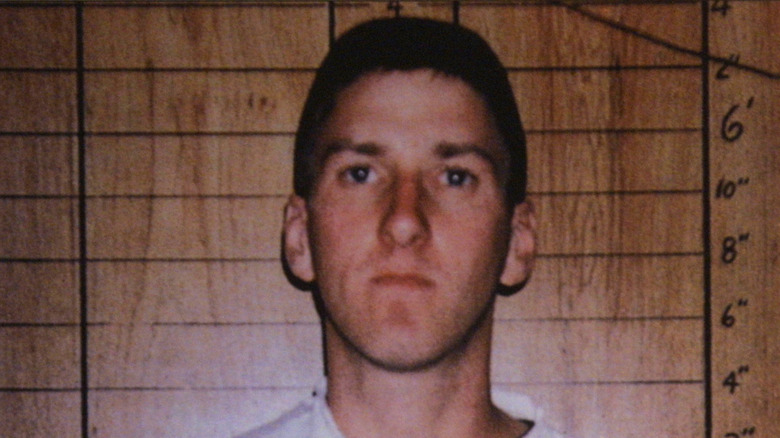David Koresh: The Messed Up Story Of The Famous Cult Leader
Before February 28, 1993, the city of Waco was just another Texas town no one outside the Lone Star State had heard of. But on that day, the Bureau of Alcohol, Tobacco, Firearms and Explosives (ATF) raided a compound that housed the Branch Davidians — a cult obsessed with Biblical depictions of the apocalypse — and forever imprinted the name Waco into the national consciousness. Suddenly, everyone had heard of David Koresh, the lanky, mulleted, aviator-wearing cult leader, who had persuaded his followers to move to a remote compound with the promise that the apocalypse was coming in the form of evil government forces. If they stayed with the self-proclaimed Messiah and fought hard enough, the few and faithful would get into heaven.
After a 51-day standoff with FBI negotiators, David Koresh's predictions appeared to come true. On April 19, the FBI began to tear down the building and insert tear gas, hoping to drive out the remaining Davidians. But six hours in, the compound caught fire, and 75 of the 84 remaining cult members died (per The U.S. Department of Justice). Who was the man whose prophecies lured people to their deaths — and what happened to him? This is the messed up story of cult leader David Koresh.
David Koresh had a dysfunctional childhood
David Koresh's start in life was turbulent. He was born Vernon Howell in Houston, TX, in 1959. His mother Bonnie was either 14, 15, or 16 at the time, depending on the source (via CBS, PBS, and Texas Monthly, respectively), and he never knew his father. Bonnie was in a couple of abusive relationships, according to ABC, and CBS News reported that one of her boyfriends beat young Koresh. Eventually he moved in with his grandparents.
Bonnie maintained that her son "had a lot of friends," but he later told FBI agents he'd been lonely as a child. His teachers suspected he had learning difficulties, placing him in special classes, and he was bullied, according to PBS. Still, Bonnie insisted to ABC that Koresh was "a very cute, lovable little boy, very inquisitive." She said he loved being outside, taking things apart, and making up stories — useful practice for a future cult leader.
After struggling in school, Koresh dropped out in ninth grade. Even after everything went down at Waco, Bonnie told ABC: "I think back then, God was working on David to prepare him for the work he had for him later on." She was found stabbed to death on January 23, 2009: Her sister was charged with her murder.
David Koresh turned to religion as a child
David Koresh connected with Christianity at an early age. His mother Bonnie said that he started reading the Bible and listening to Christian radio stations when he was 12 or 13, according to Texas Monthly. She told ABC that he would dissect the Bible in the same obsessive way he pored over truck engines. By 14 he had memorized the New Testament: by about 18, he knew the Old Testament as well. As reported by ABC, Koresh also claimed that when he was a child, God told him he was "the chosen one."
Koresh joined the Seventh Day Adventists, but was kicked out for being a bad influence, according to PBS. At some point, it appears that Koresh caused a scandal in his hometown of Tyler, TX. According to Bonnie, he got a girl named Linda pregnant when he was 19 and she was 15. Her father's furious reaction kicked off David Koresh's religious awakening. Bonnie said that around this time, Koresh became obsessed with the idea that the Holy Spirit was a big-breasted woman (an interpretation his church did not appreciate.) She said he hung out in graveyards and questioned local preachers. However, according to investigative reporter Lee Hancock (via CBS), Koresh was driven out of town after he decided that God wanted him to have sex with the preacher's daughter (who may have been Linda.) Whatever happened, he left town.
David Koresh chose a name with a specific Biblical meaning
By 1990, David Koresh had established himself as the Davidans' leader, and decided his birth name Vernon Howell, which he was still going by, was lacking a certain Messiah-esque quality. So he gave himself a new name, drawing on Biblical references that specifically connected him to the prophesied second coming of Christ.
David is a reference to King David, of David and Goliath fame. According to The World History Encyclopedia, in the Bible David is held up as a model king, who is pious, repentant, and submissive before God (and also musically talented.) Taking this first name not only identified Koresh and the Davidians as one and the same, it established him in a long line of spiritual leaders. And "Koresh" is the Hebrew word for Cyrus, per Britannica, a Persian king and the only non-Jew referred to as a "messiah" ("anointed one" in Hebrew) in scripture. This was supposed to indicate that David Koresh was specially chosen by God.
The name backed up a claim Koresh made in 1989 (and would continue to make until his death), when he declared that he was the Lamb of God, according to The U.S. Department of Justice. For non-Sunday school graduates, in the Book of Revelation, the Lamb of God is the only one who can break the seven seals on a scroll that kicks off the apocalypse, which in turn triggers the second coming of Christ, who takes the worthy to heaven. Most Christians interpret Jesus as the Lamb of God: David Koresh was effectively saying he was the new Messiah.
Before he became a cult leader David Koresh wanted to be a rock star
Like everyone else in the 1970s with long hair and an aversion to authority, David Koresh's plan A was to be a rock star. According to Texas Monthly, his mother Bonnie said that he taught himself to play guitar, adding with astounding obliviousness, "In those years he was a little bit rebellious." Koresh briefly moved to Hollywood to pursue his dream but it didn't pan out.
Koresh kept playing music when he joined the Branch Davidians in 1981, and when he became their leader, per the BBC. Koresh had a collection of guitars, customized by one of the cult members — who was an airbrush artist — with explicit scenes inspired by the Bible. In 1992, he had a band called Messiah, whose music was described as "jazz fusion, with an L.A. sound," according to SPIN. Koresh convinced local bar Cue Sticks to let him host live music nights, with Messiah jamming in between other bands. He used the opportunity to preach to his captive audience (metaphorically, in this case) about his religious beliefs, and managed to recruit a few local musicians.
Others didn't buy his exaggerations about his success in L.A. Local record store owner Calvin Ross told SPIN, "He couldn't be a rock star, so he decided to be Jesus."
That famous mugshot is from 1987
David Koresh didn't found the Branch Davidians: it was an offshoot of the Seventh Day Adventists founded in 1934 by Bulgarian Victor Houteff, per Britannica. Victor bought what became the Mount Carmel Center in 1935. When Victor died 20 years later, a power struggle kicked off, pitching his wife Florence against wannabe leaders, including Ben Roden, who eventually took control. After Ben died in 1978, the group was torn between following his wife Lois and his son George. David Koresh took Lois's side (and supposedly had an affair with the 67-year-old.) When she died in 1986, George took over — but David fought back.
According to SPIN, the two men apparently decided to determine leadership by seeing who could reanimate a corpse: This prompted George to dig up a dead Davidian and present the body on the altar. According to PBS, David briefly moved to East Texas, but returned in 1987 with seven heavily armed men: The gang staged a machine-gun battle against George. No one was killed, but George pressed charges — hence the mugshot.
Somehow, David won the case — and George was imprisoned for six months on other (equally wild) charges. When he got back to the compound, David Koresh was in full control. According to The U.S. Department of Justice, George ended up in a psychiatric institution, possibly for murdering someone he thought David had sent after him. In 1987, David wrote a song titled "Madman in Waco" about his former rival.
Koresh and the Davidians joked about being a cult
If you're aware of Scientology and other such organizations, you may already know that most cults don't like to be called cults. The Branch Davidians were the exception. "We knew it was a cult. We would joke about it all the time, like, 'Yep, we're cult members,'" former Davidian Dana Okimoto told ABC News. She added that even David Koresh openly admitted that he was running a cult. But while that definition might give many people pause, Koresh saw it as another connection between himself and Christ. Okimoto said he pointed out that Jesus started with 12 guys following him around as he preached radical religious ideas, which could also be deemed a cult.
However, David Koresh made some other admissions that were distinctly un-Jesus-like. ABC reported that he called himself the "sinful Messiah" and claimed that only someone who sinned could fully relate to the sinful nature of humans and lead them to redemption. The nickname came back to haunt him on February 27, 1993, the day before the raid. A local newspaper, the Waco Tribune-Herald, published an article with the headline "The Sinful Messiah," detailing abuse allegations from former cult members against Koresh. According to the BBC, the close dates may not be a coincidence — the ATF was among the first to read the article.
David Koresh claimed all the women as his wives
In 1989, having declared himself the Lamb of God (basically the next Messiah), David Koresh decided that all the female Davidians were his spiritual wives. This included women who were already married and pre-teen girls. All the other men were to be celibate and any marriages dissolved. Koresh also started to select "carnal" wives, who were expected to sleep with him whenever he wanted. According to the Independent, he would brag about his sexual experiences with them in front of everyone. Part of Koresh's reasoning was his desire to start his own bloodline: he fathered as many as 20 children. By the time of the raid, he had between 10 and 15 carnal wives, who were referred to as the House of David. Since Koresh claimed that God told him who to choose, it was supposed to be an honor.
According to People, some of Koresh's "wives" were as young as 14. As reported by the Chicago Tribune, in 1995, 14-year-old Kiri Jewell, who was taken to the Davidians as a child by her mother, testified to Congress that she had been groomed to become Koresh's next "wife," and forced into a sexual relationship with him when she was just 10. (Her father, who was not a Davidian, eventually won custody of Jewell and took her away from Mount Carmel. Jewell's mother Sherri died in the fire.)
If you or someone you know may be the victim of child abuse, please contact the Childhelp National Child Abuse Hotline at 1-800-4-A-Child (1-800-422-4453) or contact their live chat services.
David Koresh used harsh discipline to keep people in line
Although David Koresh could be charming, he used psychological and physical abuse to keep his followers in line. The remoteness and layout of Mount Carmel Center helped: The 77-acre compound was 13 miles away from the city of Waco, which kept the inhabitants isolated.
Koresh deployed tactics common in cult leaders, dictating every aspect of life at the compound. According to The U.S. Department of Justice, he decided when and where people slept, when they could use the bathroom, what they read and other forms of entertainment, which jobs they did, and where they went. Women weren't allowed to wear jewelry or makeup, and everyone had to listen to him preach for hours on end. He also persuaded many members to give him their possessions and money. Anyone who broke a rule would be subject to a tirade from Koresh, in front of everyone else. And he would beat people as punishment, and have other followers do the same — including to very young children.
Former Davidians have said that from the age of eight months, children were expected to instantly follow orders from adults, and were beaten with paddles if they disobeyed, sometimes to the point of drawing blood. "Everywhere is fear," Joann Vaega told ABC. She was six at the time of the raid, and was released from the compound on March 2. Her parents both died in the fire.
The Davidians were forced to follow weird food rules Koresh made up
Living on a remote compound came with hardships. Kiri Jewell, who was a child when she and her mother joined the Branch Davidians, told ABC there was no heat, running water, or power. (There must have been some electricity, according to The U.S. Department of Justice, since the FBI cut it off repeatedly during the raid, but perhaps not all the followers benefited from it.)
David Koresh also invented weird and confusing rules about food. For example, followers weren't allowed sugar, processed flour, or dairy products, the latter because he considered milk to be "baby food." There were also certain food combinations that were forbidden: Apples and bananas were fine to eat together, but not bananas and oranges. You couldn't eat fruits and vegetables in the same meal. In winter, the Davidians ate pots of plain onion soup. It wasn't necessarily that Koresh believed in these rules: He wanted to see if his followers were loyal enough to give up their favorite foods just because David Koresh told them to.
There were, however, large supplies of certain foods on the compound. The Justice Department reported that Koresh had stocked up on enough canned goods and Meals Ready to Eat (MREs) — non-perishable meals used by the military — to last a year.
David Koresh was training his followers to fight
The Branch Davidians were not a happy-clappy commune. David Koresh was turning them into an army of religious fanatics, who believed they were going to have to fight their way through an imminent apocalypse. According to the New York Times, one reason the cult came to the attention of the ATF was an incident when a UPS driver accidentally discovered that the package he was delivering to the compound contained grenades. The ATF also suspected that the Davidians were planning to illegally turn AR-15 rifles into automatic weapons. After the compound had burned down, Texas Rangers recovered a collection of 305 weapons that included pistols, military assault knives, and automatic and semi-automatic assault rifles, plus rocket projectiles and anti-tank ammunition, according to The U.S. Department of Justice.
David Koresh spent years putting his followers (including the children) through military-style training, to prepare for what he said would be a huge attack from the government. This all played into his vision of the apocalypse, based on the Book of Revelation in the Bible. The Davidians believed they would have to fight the Beast of Babylon — which Koresh identified as the government — to trigger the apocalypse and prove themselves worthy of heaven.
Unfortunately, the ATF's subsequent raid seemed to corroborate his ideas. "He had been saying for such a long time that they were going to come for us ... They did exactly what he said they were gonna do," Kiri Jewell told ABC.
David Koresh wanted media attention
If you were tuned into Dallas radio station KRLD between 4 pm and 5 pm on February 28, 1993, you might have wondered who the guy rambling about Seven Seals was. You guessed it: It was David Koresh. The FBI agreed to broadcast audio tapes recorded by Koresh at multiple points during the prolonged negotiations, in return for Koresh surrendering, or releasing all the children (via The U.S. Department of Justice). But Koresh consistently reneged on his promises. In the recordings, he rambled about his ideology: One, which aired on KRLD and Christian Broadcasting Network (CBN), was nearly an hour long.
But David Koresh didn't just get media attention through the FBI. At 2:30 pm on February 28, Koresh's second-in-command, Steve Schneider, called CNN from inside the compound, which was under fire. He demanded they tell the ATF to call off the assault and tried to explain their religion. Finally, editor Dave Schechter managed to get a wounded Koresh on the phone and persuaded him to go live on air with anchor David French.
While the news network was delighted to get the scoop, the FBI was, as Schechter put it, "livid beyond the point of being apoplectic." Not only was CNN tying up a phone line, but also giving David Koresh media access limited the FBI's negotiating power. "We didn't call them, they called us," Schechter pointed out.
Who killed David Koresh?
Contrary to popular belief, David Koresh was not killed by the fire that engulfed the Mount Carmel compound on April 19, 1993. (Also contrary to popular belief, an independent investigation determined the fire was started from the inside, according to The U.S. Department of Justice. That said, the FBI was later found to have unsuccessfully used "two or three" pyrotechnic M-651 rounds.) A report by the Texas Rangers and FBI determined Koresh's cause of death as a bullet wound to the temple. Of the 50 adults and 25 children whose bodies were recovered from the compound, 17 died from gunshot wounds, including at least four children. The report did not draw conclusions over whether Koresh committed suicide or was killed by one of his followers.
The FBI had feared Koresh would order a mass suicide throughout the siege, despite his constant assurances that this wasn't his plan. (He wasn't exactly reliable.) According to the Justice Department, on March 2, one of the Davidians who had been released from the compound told the FBI that Koresh was planning to come out with a small group and blow himself up, while everyone else killed each other and themselves. He then canceled this plan, saying God told him to wait.
What actually happened in David Koresh's last moments will likely remain a mystery, but his desire for power and its devastating consequences will never be forgotten.
If you or anyone you know is having suicidal thoughts, please call the National Suicide Prevention Lifeline by dialing 988 or by calling 1-800-273-TALK (8255).
The family of his one legal wife were diehard supporters
Of the multiple people that David Koresh convinced to follow him, few were as tightly connected to the cult leader as the Jones family. Koresh may have had several spiritual wives on the compound, but he was legally married to only one woman, Rachel Jones, whom he wed when she was only 14 years old. During the nine years the couple was together, Koresh not only had a son, Cyrus, and a daughter, Starr, with Rachel, but he also had two children with her younger sister, Michelle.
Neither the father of the two girls, Perry, nor their brother, David, seemed to have objected to any of this, and instead the men were two of his most devoted supporters. Both dad and son served as warriors and protectors of Koresh, with Perry in a more trusted position as the one tasked with procuring vital supplies for the compound.
Before Rachel and her family tragically perished at Waco, those who interacted with her just had positive things to say about her, but it was clear that the troubling relationship had changed her as well. Local resident Mark Bunds, whose family was close with the Joneses and others at the compound, told The Washington Post, "Rachel used to be a real bubbly kid, real loving and happy and fun. She didn't seem to be the same way when I came back to Waco four years ago. She was definitely more serious, and quiet." Lawyer Jack Zimmermann, one of the last outsiders to see her before the end, also said, "She was polite and pleasant and very quiet."
Surviving cultists still believe he will be resurrected one day
David Koresh had made such a profound impact on his cult followers that even decades after his death at Waco, not only has their faith in him not faltered amongst them, but some in the group also continue to think of him in supernatural terms to this day. The most vocal one about the leader's epic return from beyond the grave has been Clive Doyle, as he told NPR, "We, as survivors of 1993, are looking for David and all those that died either in the shootout, or in the fire. We believe that God will resurrect this special group."
Others who remain devoted adherents, such as Sheila Martin, are less broad in their expectations and would be content to simply have their beloved leader to appear back in the realm of the living. In an episode of the docuseries, "Murder Made Me Famous," in 2017 Martin said, "David came to give us a message and a hope. We hope to see him again. Our regret is only that we didn't serve God better" (via People).
His showdown with law enforcement inspired the OKC bombing
In 1995, just two years after the siege of Waco, another horrific event took place that may seem unrelated at first, though a deeper look reveals that the two were closely linked. When Timothy McVeigh carried out his terrorist bombing of the Alfred P. Murrah Federal Building in Oklahoma City, he believed his actions were a justified retaliation for grievous crimes committed under the direction of federal law enforcement.
In his mind, McVeigh had all the proof he needed that the government was out of control and must be stopped, because he saw it with his own eyes. During the confrontation between the ATF, the FBI, and David Koresh's Branch Davidians, several witnesses viewed the chaos from a distance on a nearby hilltop. McVeigh made sure he was one of those watching from afar, and afterwards he walked away disgusted.
While the earlier, similar incident at Ruby Ridge, Idaho, was also a major reason for McVeigh's later horrendous attack, the numerous deaths at the Branch Davidian compound were the last straw. After he was interviewed by reporter Michelle Rauch, she later wrote, "McVeigh said he believes the government is greatly at fault in Waco and has broken constitutional laws. He quoted the U.S. Constitution and said U.S. armed forces should not be used against civilians, yet they were used against Koresh and his followers" (via The Oklahoman).
